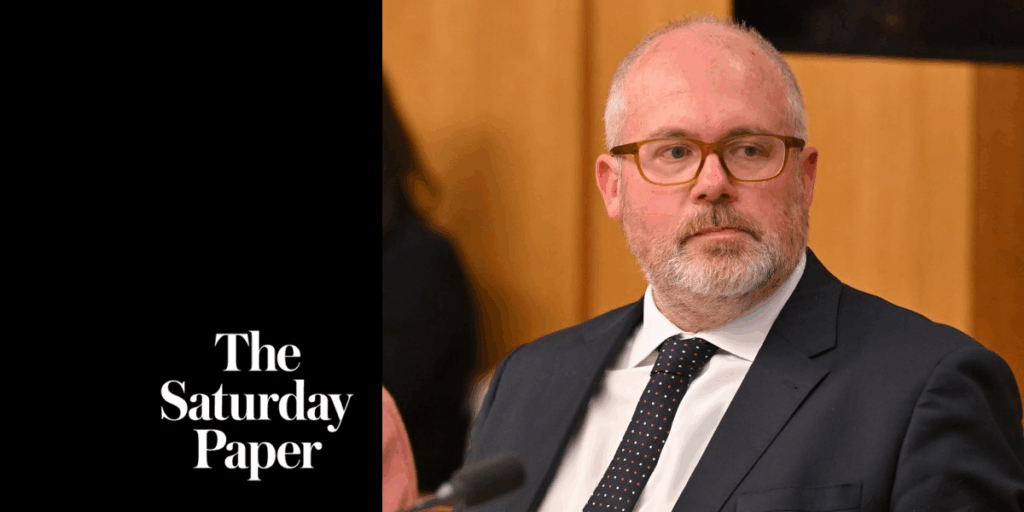
Tim Ayres, Australia’s minister for industry and innovation, is facing increasing pressure to implement comprehensive new laws to address the risks associated with rapidly advancing artificial intelligence (AI) technology. In a recent interview with The Saturday Paper, Ayres expressed his resistance to the calls for a unified AI legal framework, which has been strongly advocated by artists and unions concerned about intellectual property and job security.
This stance marks a significant shift from his predecessor, Ed Husic, who had proposed a more comprehensive approach to AI regulation. Ayres emphasized a pragmatic approach, aligning with the current trend in Canberra towards deregulation, a theme expected to dominate discussions at the upcoming Economic Reform Roundtable starting on August 19.
Ayres stated his desire for Australia to be in the “box seat” for AI investment, while acknowledging the need for the technology to “work for everyone.” He argued that existing administrative tools are sufficient to manage the potential downsides of AI, citing the powers of financial regulation authorities and criminal law as examples.
Concerns from Artists and Unions
Artists and creative groups have voiced concerns that their work is being exploited by AI technologies, threatening their livelihoods. Unions are also worried about large-scale job replacement as AI becomes more integrated into the Australian economy. The push for new regulations adds to the challenges the government faces in managing the dominance of U.S. tech giants in the media landscape.
Efforts to regulate these companies have been met with mixed reviews, with some criticizing them as either too restrictive or ineffective. Past attempts include a news media bargaining code and a ban on social media for children.
Comparisons to Social Media Regulation
Experts often draw parallels between the current AI debate and the earlier challenges posed by social media. A science and industry insider told The Saturday Paper,
“The genie is out of the bottle. Too late to get the social media companies who are benefiting from everyone’s misery to do anything to protect. We don’t want to make that mistake again.”
There is a division within the Labor caucus on how to proceed. Ed Husic, now a backbencher, continues to advocate for a legislative approach, arguing that the absence of government intervention is no longer viable. He proposed an AI act to establish a stable, unified regulatory framework, a move supported by nearly two years of consultation.
Economic Implications and Government Stance
The Productivity Commission estimates that loosening AI regulations could add $116 billion to Australia’s growth over the next decade. Treasurer Jim Chalmers has emphasized the government’s mission to find a “responsible middle path” between restraining AI and allowing it to flourish.
Leaked Treasury advice suggests a national AI plan could expedite environmental approvals. Chalmers stated,
“When it comes to regulation, it’s really all about doing as much regulation as we need to protect people and as little as we can to encourage innovation.”
Despite these discussions, the government has not committed to legislating AI at this stage. Ayres remains focused on leveraging AI’s opportunities while cautiously addressing regulatory implications.
Challenges and Future Steps
Among the most pressing concerns are AI-powered scams, deepfakes, and discrimination by AI recruiters. Human Rights Commissioner Lorraine Finlay has called for an AI act to monitor potential biases in AI functions.
Ayres has ruled out changes to the Copyright Act, despite calls from the Media, Entertainment and Arts Alliance for an economy-wide AI act. Arts Minister Tony Burke has also dismissed weakening copyright laws based on current reports.
The Coalition has criticized the government for its inconsistent approach to AI regulation. Opposition industry spokesman Alex Hawke highlighted the lack of progress despite multiple ministers handling the issue.
Independent ACT Senator David Pocock has warned of the potential for AI to reach human-level intelligence, urging for an overarching AI act. He expressed disappointment at the previous parliament’s lack of focus on AI’s challenges.
Ayres remains committed to a careful and pragmatic approach, emphasizing the importance of seizing AI’s opportunities while managing its risks. As the debate continues, the government faces the challenge of balancing innovation with oversight to ensure AI benefits all Australians.






